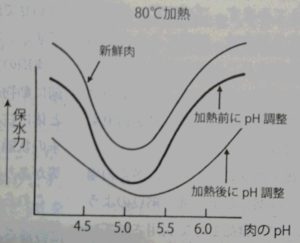One method of tenderizing meat is marinating.
Marinating is a cooking method in which meat is soaked in a mixture of vinegar, wine, oil, spices, herbs, etc.
Marinating increases the tenderness of cooked meat by swelling the muscle fibers and connective tissue of the meat.
The reason for this is related to pH. Looking at the pH of the main marinade liquid
wine vinegar pH2.5
wine pH 2.3
lemon juice pH 2.8
Soy sauce pH 4.7
Vinegar pH 3.0
*Meat pH 5.5
, indicating that it is quite acidic. When meat is exposed to acidic conditions, three changes occur that are related to meat tenderization.
(1) Improved water retention
(2) Activation of acidic proteases inherent in muscle.
(3) Collagen swells
As for (1), it shows the lowest value around pH 5, and increases on both the acidic side and the alkaline side. The marinating process lowers the pH of the meat to around 4, which increases the water retention capacity of the meat and softens the meat. (It softens even in alkalinity, but humans prefer acidity.)
In (2), meat tenderization occurs due to intramuscular acidic proteases that are activated at low pH (pH 3-4).
In (3), when the meat becomes acidic, the collagen contained in the hard muscles of the meat swells, accelerating gelatinization and softening.

Protease: A general term for enzymes that act on proteins or peptides to hydrolyze peptide bonds
From the above, meat becomes tender when tilted to acidity.
From here on it's subjective.
A long time ago, there was a TV show about making kakuni by pickling meat in cola. When I looked it up, Coca-Cola had a pH of 2.4. I mean, it made sense.
By the way, mirin does not have the effect of softening meat, while sake does so because of its low pH.
pH of mirin 5.0-6.0
Sake pH 4.0-4.5
Beer pH 4.0-5.0
Wine pH 2.3-3.3
Yogurt pH 4
